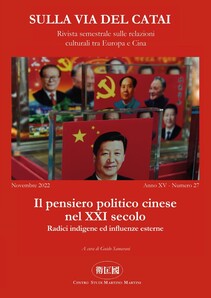Sulla Via del Catai - Nr. 27, Novembre 2022 |
|
|
Description
IL PENSIERO POLITICO CINESE NEL XXI SECOLO Radici indigene ed influenze esterne Sfoglia le prime pagine INDEX INTRODUZIONE pag. 9 SAMARANI, Guido - Università Ca’ Foscari Venezia BRUSADELLI, Federico - Università degli Studi di Napoli “L’Orientale” IL CENTRO, IL POTERE, LA TECNICA: LO HAN FEIZI E LA ‘FORZA’ SECONDO XI JINPING pag. 13 The Center, the Power, the Technique: the Han Feizi and the 'strength' according to Xi Jinping Abstract: The present article intends to offer an analysis of some Legalist quotations (specifically from the Han Feizi) used by president Xi Jinping in some of his public speeches. In particular, the Chinese leader’s references to the pre-imperial strain of thought will be contextualized as part of his broader political and cultural agenda, stressing the enduring relevance of some key Legalist concepts (centralization, control technique, strength) in the ongoing process of elaborating a “Xi Jinping thought” for the 21st century. Read GALLELLI, Beatrice - Università Ca’ Foscari Venezia & Istituto Affari Internazionali DALLA ‘CIVILTÀ SPIRITUALE ’ ALLO ‘SPIRITO CINESE’: STRATEGIE DI GOVERNANCE NELLA CINA POST-MAOISTA pag. 33 From 'spiritual civilization' to 'Chinese spirit': governance strategies in post-Maoist China Abstract: Jingshen 精神, ‘spirit’, has been a keyword of Chinese political discourse since the late 19th-early 20th century, when it was used to express the need to carve out a nation-mindedness in China. Since the late 1970s it has been brushed up in the formula ‘spiritual civilization’ and recently the formulation ‘China spirit’ has come out. This study traces the evolution of ‘spirit’ in Chinese political discourse and, by doing so, it will point out what the new ‘China spirit’ promoted by the current leadership entails in terms of governance strategy. Read LANZONE, Maria Elisabetta - Università di Padova LAVAGNO, Fabio - IIS “Cesare Balbo” Casale Monferrato PUÒ ESISTERE UNA ‘DEMOCRAZIA CONFUCIANA’ IN CINA? LA NUOVA ERA DELLA ‘MERITOCRAZIA’ TRA SOFT POWER, TRADIZIONE E INNOVAZIONE pag. 53 Can a 'Confucian Democracy' Exist in China? The New Era of 'meritocracy' between soft power, tradition and innovation Abstract: Western Liberal Democracies appear affected by a multiple crisis almost everywhere. From 2006 we are seeing a slowdown of some important processes of democratization and the rise of ‘non-democratic’ regimes. In the same context, China, with its effectiveness, faces the Western World with a big dilemma regarding the supremacy of ‘democratic model’ and the performance of decision-making process. What are the main traits of the current Chinese political regime? Is it possible to combine democratic elements with Confucian thought and meritocracy, or Liberalism remains the only way towards democracy? And the current Chinese regime represents a peculiar case able to efficiently use different elements in order to pursue order, balance and meritocracy? Read MECCARELLI, Marco - Università di Catania IL PARADIGMA MUTEVOLE TRA ARTE E POLITICA NELLA CINA CONTEMPORANEA pag. 85 The shifting paradigm between art and politics in contemporary China Abstract: Contemporary Chinese artists have long been marginalized in China as their ideas conflict with the mainstream political ideology. This article explores the profound change in the political decisions about the commercial potential of the artistic product, in order to guarantee positive feedback in terms of image, nationally and internationally. The main movements and artistic personalities involved in this complicit and conflicting dialogue between political action and expressive freedom will be examined. Read MIRANDA, Marina - Università di Roma “Sapienza” VOCI E ORIENTAMENTI LIBERALI IN CINA TRA LA FINE DEL NOVECENTO E GLI ANNI DUEMILA pag. 103 Liberal Voices and Orientations in China between the end of the twentieth century and the 2000s Abstract: Although not well defined, the emergence and spread of liberal thought in China can be divided into two distinct cycles: a first one, covering the 1980s up to the Tian’anmen massacre, and a second one, starting in the 1990s. Being a direct result of the early reforms, the first stage is related to the ideas behind the Democracy Movement of 1989, which found inspiration from the Enlightenment Movement of the 1920s. As a response to the social contradictions of the late reforms in the 1990s, the second stage benefited from the contributions of personalities such as Li Shenzhi, Liu Junning, Xu Youyu, Qin Hui, Zhu Xueqin. Read SAMARANI, Guido - Università Ca’ Foscari Venezia IL PENSIERO DI XI JINPING E IL ‘MARXISMO DEL XXI SECOLO’ pag. 125 Xi Jinping Thought and '21st Century Marxism' Abstract: This paper outlines and discusses the recent developments in the People’s Republic of China withing the political and ideological system: a system characterized by the Chinese Communist Party’s official claim that “Xi Jinping Thought on Socialism with Chinese characteristics in the new era” represents a new chapter of 21st century Marxism. In the first part, it analyses the origins, main trends and the work by some leading Chinese theoreticians about Xi Jinping Thought and Chinese Marxism in the new century; then it provides an essential view of the role of the Academy of Marxism and the various schools of Marxism studies in China in the process of research, teaching and popularization of such new trends. Read SAVINA, Tonio - Università di Roma “Sapienza” LA ‘TEORIA CINESE DELLE RELAZIONI INTERNAZIONALI’ E IL PARADIGMA DEL ‘COOPERAZIONISMO PACIFICO’ DI YU XIAOFENG pag. 137 The 'Chinese International Relations Theory' and Yu Xiaofeng's paradigm of 'peaceful cooperation' Abstract: After briefly summarizing the development of the so-called ‘Chinese Theory of IR’, this essay analyses Yu Xiaofeng’s concept of ‘peacecooperativism’. It is here stressed how this formula has been conceived as a comprehensive paradigm, aiming to embody all of the Chinese approaches that take ‘harmony’ as the main assumption in the conduct of international affairs. Furthermore, the limitations and shortcomings of this concept will be also presented. Read |
|


